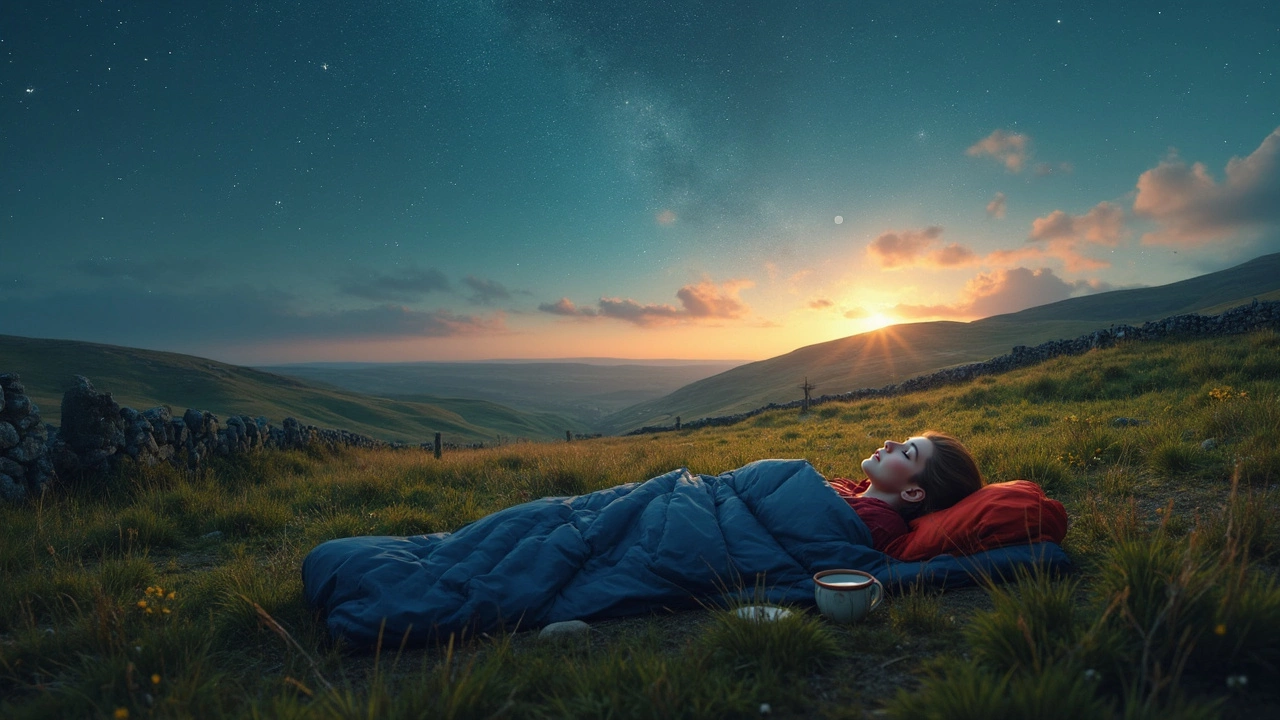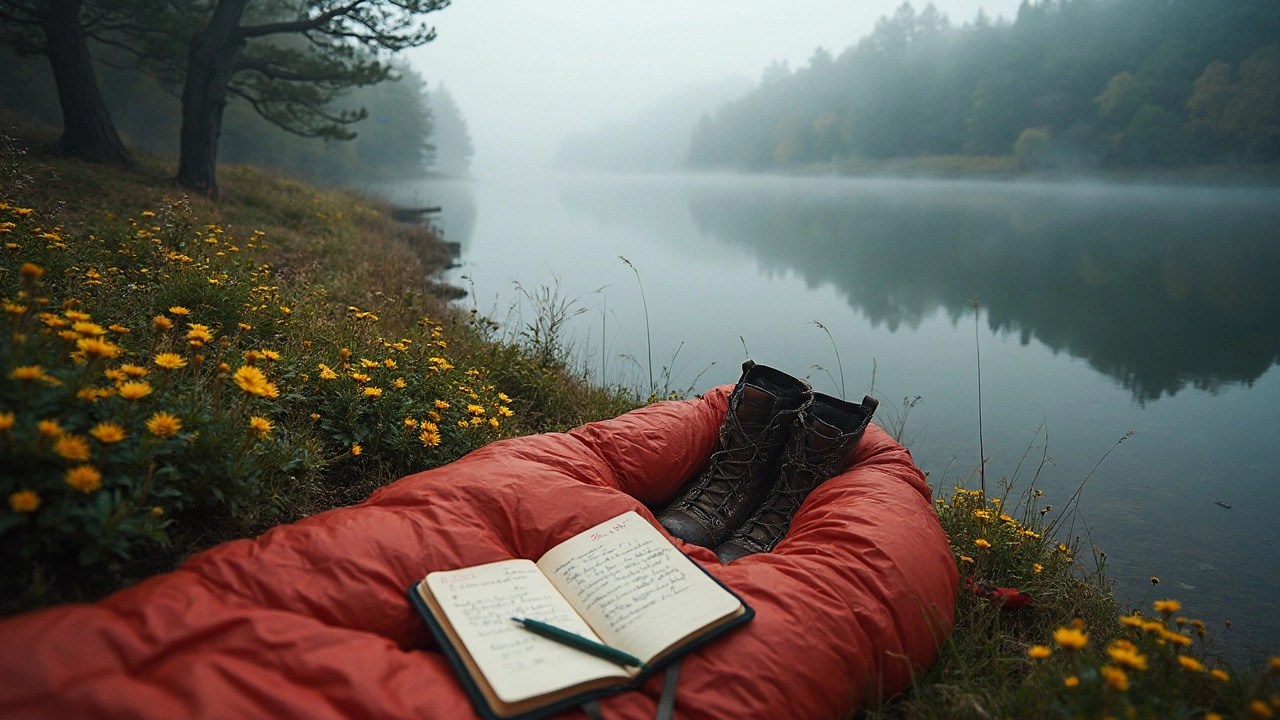Cowboy Camp: The Wildest Way to Camp in the UK
 May, 1 2025
May, 1 2025
Sleeping under the open sky in the UK sounds a bit mad if you’re used to zipped-up tents and heavy-duty tarps. But that’s what cowboy camping is—just rolling out your sleeping bag straight on the ground, usually with no tent, sometimes with a tarp if you’re feeling fancy. It’s the purest form of wild camping: simple, raw, and kind of addictive.
Why bother? For starters, you get to ditch all that bulky gear. Your pack’s lighter and setup takes less than a minute. You’re lying right under the stars, and you feel a lot closer to the wild than inside a zipped nylon pod. But let’s be real—moisture, midges, and unpredictable showers are all part of the deal. Still, with a few tricks, you can have a downright brilliant experience. Let’s get into how cowboy camping really works and why people in the UK are starting to choose wild ground over crowded campsites.
- What Exactly Is Cowboy Camping?
- Pros, Cons, and Real Risks
- How to Cowboy Camp Comfortably in the UK
- Staying Safe and Legal: The UK Lowdown
What Exactly Is Cowboy Camping?
So, what’s the big deal with cowboy camp? It’s basically sleeping outside with no tent. You roll out a mat or a groundsheet, open up your sleeping bag, and just sack out under the stars. It takes wild camping right back to basics—no tent poles, no rainfly, and nothing between you and the night sky.
The name comes straight from American cowboys in the 1800s. They didn’t have gadgets or fancy shelters; just a bedroll and the open plains. That same free-and-easy style is catching on with wild camping UK fans who want less faff, more adventure, and better stargazing. In the UK, folks usually cowboy camp by choice, not because they have to, which makes a weird kind of sense—why not try sleeping outside the box?
Here’s what’s different about cowboy camping compared to classic wild camping setups:
- No tent, just a bag and usually a sleeping mat or bivvy bag. Sometimes a tarp if rain looks likely.
- You pick a flat patch and set up in minutes. If you spot a better view (or realize you’re lying on a rock), it’s easy to move.
- There’s no barrier to the outdoors, so you feel—and hear—everything: breezes, sunrise, birds, dew, maybe the odd squirrel.
Staying warm and dry is the main trick. A waterproof groundsheet or bivvy bag stops damp rising up. In places like Dartmoor, wild camping rules make cowboy camp totally doable as long as you’re sensible and “leave no trace.”
Check out this quick comparison of basic gear:
| Camping Style | Essential Gear |
|---|---|
| Cowboy Camp | Sleeping bag, mat, groundsheet/bivvy, optional tarp |
| Traditional Wild Camping | Tent, sleeping bag, mat, poles, pegs, rainfly |
If you want to feel the wild UK night as it really is—no filter and no fuss—cowboy camping is about as real as you can get.
Pros, Cons, and Real Risks
People get hooked on cowboy camp for good reason, but it isn’t just a dreamy night of stargazing. Here’s the reality—straight up, no sugar-coating.
Upsides of Cowboy Camping
- Ultra-light loads: Leave the bulky tent at home, making your pack way easier on the shoulders.
- No-fuss setup: Find a spot, unroll your mat and bag, and you’re sorted in minutes. No fiddling with poles or guy lines in the dark.
- Unbeatable views: Wake up to the sunrise, stars overhead, or even a cheeky fox sniffing around. Nature feels right next to you.
- Sense of freedom: There’s nothing between you and the wild. Some say this is the real reason to try wild camping UK at least once.
Downsides You Can’t Ignore
- Weather roulette: Even in summer, UK weather is unpredictable. There’s always a risk of overnight rain or dew. You’ll want a bivvy bag or emergency tarp handy.
- Midgies and bugs: In Scotland during summer, you’ll be lunch for midges unless you plan or use repellent. Even in the south, slugs and beetles think your sleeping bag is prime real estate.
- Lack of privacy: No tent means zero barriers if you need to change or get caught by early-morning hikers.
- Animals: It’s unlikely anything will bother you, but don’t leave food scraps out. Foxes, badgers, or even curious sheep can turn up.
Real Risks? Let’s Be Honest
Nothing glamorous here—hypothermia can sneak up, even in what feels like mild weather if you get damp and cold. You’re open to the elements, so a sudden downpour or strong winds can make for a miserable night. Plus, some places in the UK—like Dartmoor—have slightly more legal leeway, while others are stricter, so check local rules fast.
One regular wild camper in the Lake District told
“Cowboy camping in the UK is totally doable if you plan well, pick your night, and don’t mind waking up a bit soggy sometimes. Best views I’ve ever had, though.”
| Potential Risk | How to Handle |
|---|---|
| Rain or heavy dew | Always carry a bivvy bag or lightweight tarp |
| Insect bites | Use repellent, sleep upwind of boggy spots |
| Cold nights | Pick a warmer bag, wear base layers |
| Getting spotted | Camp later in the evening and pack up early |
A final word: The thrill of cowboy camp is real, but so are the soggy sleeping bags if you don’t prep. When in doubt, start small—try your first run close to home or in your own garden before heading out into proper wild camping UK territory.

How to Cowboy Camp Comfortably in the UK
If you’re thinking about ditching the tent and going full cowboy camp in the UK, comfort isn’t just a luxury—it’ll decide if you actually enjoy the night. Our weather’s unpredictable and sometimes wild, so a few clever choices make all the difference.
First, check the forecast. Hard to overstate this: if heavy rain’s on the cards, leave cowboy camping for another night. Even with no rain predicted, bring a lightweight tarp just in case. In the UK, a sudden shower at 2 a.m. is almost a tradition.
Your sleeping gear is everything. Go for a sleeping bag that handles low temps, even in summer—June nights in the Highlands can drop to 4°C (just over freezing). Pair it with a quality foam pad or inflatable mat, not just for comfort, but insulation from cold ground and sneaky damp. A bivvy bag (think waterproof cover for your bag) is a favourite with experienced wild campers, adding a solid backup layer if conditions turn sketchy.
Here’s what most seasoned UK wild camping fans never skip:
- Groundsheet: Keeps moisture and mud at bay, handy on boggy ground.
- Midge net: Summer in Scotland? Thank me later.
- Tarp: Lightweight, gives quick shelter for sudden drizzle or wind gusts.
- Headtorch: For setting up or finding the loo in pitch-black countryside.
Location matters. Find a slight rise (but not the top of a hill), away from water sources—valleys collect cold air and dew, while riverbanks summon midges and, sometimes, curious livestock. Keep an eye out for animal trails—you don’t want to wake up nose-to-nose with a sheep.
According to a 2023 poll by the UK Camping and Caravanning Club, about 38% of Brits who camped outside in the last two years have done it without a tent once or more. What do most regret? "Not bringing a bivvy or tarp," gets top mention.
| Essential Gear | Why It's Needed |
|---|---|
| Bivvy bag | Protection from dew, rain, and wind |
| Sleeping mat | Insulates from cold ground, adds comfort |
| Groundsheet | Blocks damp and ticks, keeps bag clean |
| Headtorch | Safety at night, finding gear, reading maps |
| Midge net | Prevents bites in buggy areas |
Quick tip: don’t zip up your sleeping bag all the way. Leave a little gap for airflow. That plus a bivvy means less condensation and a much drier wakeup. Stick with these basics, and cowboy camping in the UK’s wild spots goes from risky to properly rewarding.
Staying Safe and Legal: The UK Lowdown
Cowboy camping in the UK throws you right into the wild, but the rules and safety stuff can trip people up fast. First up, wild camping (which includes cowboy style) is technically illegal in most of England and Wales unless you’ve got the landowner’s permission. Scotland’s a whole different story—thanks to the Land Reform (Scotland) Act 2003, wild camping is legal almost everywhere, under a few sensible rules.
Here’s what you need to stay out of trouble:
- In England and Wales, always ask the landowner first. If that’s not possible, keep things low-key—arrive late, leave early, and never set up in fields with crops or livestock.
- In Scotland, stick to the Outdoor Access Code: camp in small groups, don’t linger longer than a couple of nights, and pack out every bit of rubbish.
- No matter where you are, avoid lighting campfires unless you’ve got permission and know it’s safe. Cowboy camping without a fire is way safer, especially in dry weather.
Safety is just as important as the rules. The UK weather can change hours by the coast or up in the hills. Thunderstorms, gusty winds, and sudden cold snaps all happen—the open-air part of cowboy camp leaves you exposed. Here’s how to keep yourself sorted:
- Check the forecast before you go and have a backup plan if the weather looks rough.
- Pack a bivvy bag, and don’t rely on just a sleeping bag—moisture is everywhere, even on a clear night.
- Leave your route with someone you trust. There’s usually no mobile signal on remote moors or mountains.
- Keep animal encounters in mind: curious sheep are harmless, but ticks are everywhere—cover up and do a check in the morning.
| Region | Wild Camping Legal? |
|---|---|
| Scotland | Yes, under Outdoor Access Code |
| England | Only with landowner's permission |
| Wales | Only with landowner's permission |
| Northern Ireland | Private land only, permission needed |
Always follow the leave no trace principle: no litter, no damage, and no loud music. A NatureScot spokesperson sums it up well:
"Be responsible, be respectful, and campers will always be welcome in Scotland’s wild places."
Respecting the law and looking after yourself means you’ll have more chances to go out cowboy camping—and you’ll make it better for the next person too.